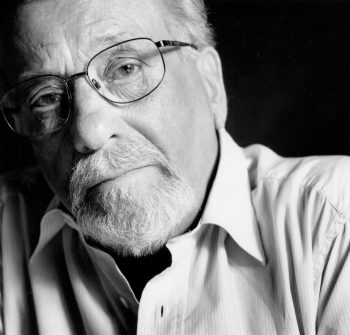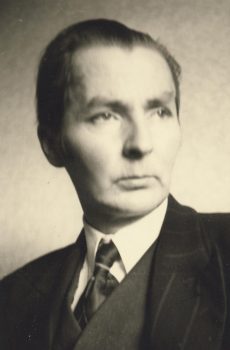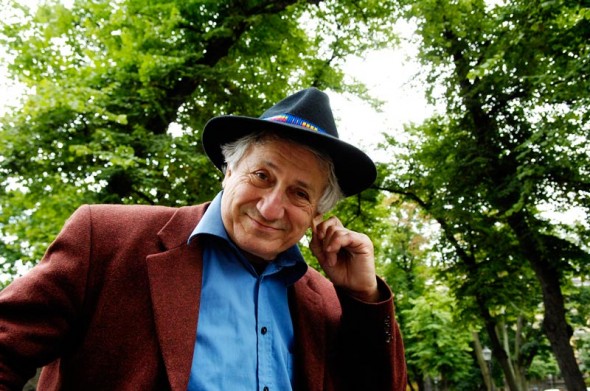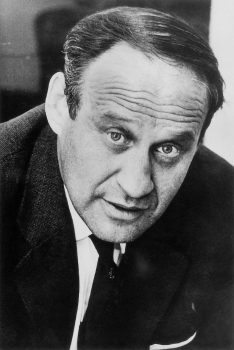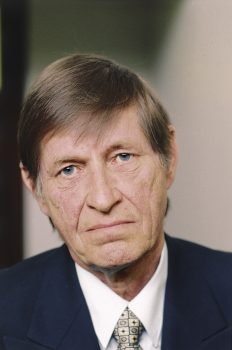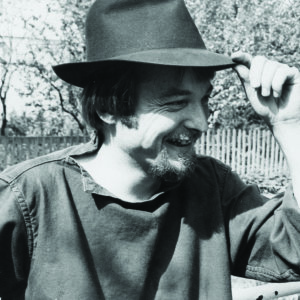Tag: novel
About calendars and other documents
Issue 2/1982 | Archives online, Fiction, Prose
An extract from Sudenkorento (‘The dragonfly’, 1970). Introduction by Aarne Kinnunen
I now have. Right here in front of me. To be interviewed. Insulin artist. Caleb Buttocks. I have heard. About his decision. To grasp his nearly. Nonexistent hair and. Lift. Himself and. At the same time. His horse. Out of the swamp into which. He. Claims. He has sunk so deep that. Only. His nose is showing. How is it now, toe dancer Caleb Buttocks. Are you. Perhaps. Or is It your intention. To explain. The self in the world or. The world. In the self. Or is It now that. Just when you. Finally have agreed to. Be interviewed by yourself. You have decided. To go. To the bar for a beer?
– Yes. Can you spare a ten?
– Yes.
– Thanks. See, what’s really happened is that. My hands have started shaking. But when I down two or three bottles of beer, that corpse-washing water as I’ve heard them call it, my hands stop shaking and I don’t make so many typing errors. If I put away six or seven they stop shaking even more and the typing mistakes turn really strange. They become like dreams: all of a sudden you notice you’ve struck it just right. Let’s say, ‘arty’ becomes ‘farty’. Or I mean to say, ‘it strikes me to the core’ I end up typing ‘score’. It’s like that. A friend of mine, an artist, once stuck a revolver in my hand. Imagine, a revolver! I’ve never shot anything with any kind of weapon except a puppy once with a miniature rifle. My God, how nicely it wagged its tail when I aimed at it, but what I’m talking about are handguns, those shiny black steelblue clumps people worship as heaven knows what symbols. It’s not as if I haven’t been hoping to all my life. And now, finally, after I’d waited over fifty years, it turned out that the revolver was a star Nagant, just the kind I’d always dreamed of. So if I ever got one of those, oh, then would sleep through the lulls between shots with that black steel clump ready under my pillow. Well, my friend the artist set out one vodka bottle with a white label and three brown beer bottles with gold labels on the edge of a potato pit – we had just emptied all of them together – stuck the fully loaded star Nagant into my hand, took me thirty yards away and said:
– Oh, Lord. More…
The Session
Issue 2/1982 | Archives online, Fiction, Prose
Pappas flicka (‘Daddy’s girl’, 1982), an extract of which appears below, is published in Finland by Söderstrom & C:o and in Sweden by Norstedt. The Finnish translation is published by Tammi. Introduction by Gustaf Widén
At first I say nothing, as usual.
Dr Berg also sits in silence. I can hear him moving in his chair and try to work out what he’s doing. Is he getting out pen and paper? Or perhaps he has a tiny soundless tape-recorder he is switching on.
Or is he just settling down, deep down into his armchair, one leg crossed over the other, like Dad used to sit? I used to climb up on to his foot. The he would hold my hands and bounce his foot up and down, and you had to say “whoopsie” and finally with a powerful kick, he would fling me in the air so that I landed in his arms.
I have worked it out that the little cushion under my head is to stop us lunatics from turning our heads round to look at Herr Doktor.
It would certainly be nice to sit bouncing up and down on Dr Berg’s foot. His ankle would rub me between my legs …
I soon start feeling ashamed and blush.
“Mm,” says Dr Berg, as if reading my thoughts. Or can he see my face from where he is sitting? I try rolling my eyes up to catch a glimpse of him, but all I can see is the ceiling with all its thick beams.
“I seem to have been here before,” I say. More…
An end and a beginning
Issue 1/1982 | Archives online, Fiction, Prose
An extract from Det har aldrig hänt (‘It never happened’, 1977). Translated and introduced by W. Glyn Jones
There they are!
Over the ice they ride. The hoofs in rhythmical movement kick up the snow. The trail points north west. The sound of the hoofs is absorbed in the blue twilight of a March evening. The two horsemen push on, close together, passing one tiny island after another. Their eyes are fixed on a trail which has lain before them throughout the day. They are hunting like wolves. Yes, like wolves they are.
Or are they?
The twilight gives way to darkness and the black of night. The riders lean low over their horses in an attempt to follow the trail, but at last one of them raises his hand. The hunt is called off. The horses snort and toss their heads so their manes dance. Clouds of steam rise from them, enveloping the men as they dismount and lead their horses to an islet where the dark and deserted profile of a fisherman’s cabin can be glimpsed. Heaven knows who the hut belongs to, but it is a good thing that it is there with its walls and a roof, a shelter against the night. More…
The Last War Hero
Issue 1/1981 | Archives online, Fiction, Prose
An extract from 30-åriga kriget (‘The Thirty Years’ War’). Introduction by Markku Envall
First he heard the noise.
It was an unfamiliar noise and therefore doubly dangerous. Viktor grabbed his machine-pistol. It was a sputtering noise, like that of a cracked machine-gun. But it came from above. And what came from above could be dangerous, Viktor knew.
Then he saw the helicopter, flying just above the tree-tops. He had never seen a helicopter before. Nor had he ever seen the circular markings carried by the aircraft as a sign of the nationality. More and more nations were getting involved, he had had a visit from an American, for all he knew this might be a plane from Australia. The Russians must be in a tight corner if they had to keep sending their allies into the firing line.
He bitterly regretted having let the American sergeant get away.
Now they were after him in real earnest. It must have been the Yankee who had sent them.
Viktor directed a long burst of fire at the plane, which was now hovering almost motionless in the air, like a bee over a flower. The bullets shattered the roboter blades, splinters flew in all directions, and the helicopter dived at a steep angle and plunged into the lake. Viktor leapt to his feet and shouted “Hurrah!” and proceeded to execute a gleeful victory dance. He had shot down an enemy aircraft. More…
Father
Issue 4/1980 | Archives online, Fiction, Prose
An excerpt from Laturi (‘The explosives expert’, 1979). Introduction by Pekka Tarkka
“It only took one good bash!” With tears in his eyes, chuckling and spluttering, Korppi, the sentimentalist, told the story of Linda’s love affair. Korppi hadn’t been an old codger then; like Chekov’s Versinin, he could have been dubbed the love-lorn major, although he was only a lieutenant for he had loved little Linda when he had been an officer guarding the refugees interned on Suursaari: interned not for their safety but for the protection of his country. “She loved getting parcels, oh yes, but she didn’t give a damn for me! And did I take what belonged to me?
Yes! No! I nibbled here and there but I never swallowed a whole bite … On the other hand, there were some who took a bite and swallowed it, one of them was called …”
“Selim!” shouted Enver.
Selim, that jelly. He was Korppi’s subordinate on guard duty, and had he known the other fellow had been flirting with Linda he would have killed her! But how could he have known? What took place under a clump of hills along a wooded lake shore… More…
The strike
Issue 4/1980 | Archives online, Fiction, Prose
An extract from Täällä Pohjantähden alla (‘Here beneath the North Star’), chapter 3, volume II. Introduction by Juhani Niemi
With banners held aloft, the procession of strikers moved towards the Manor. It was known that the strikebreakers had arrived early and that the district constable was with them. Just before reaching the field the marchers struck up a song, and they went on singing after they had halted at the edge of the field. The men at work in the field went on with their tasks, casting occasional furtive glances at the strikers. Nearest to the road stood the Baron and the constable. Uolevi Yllö’s head was bandaged: someone had attacked him with a bicycle chain as he left the field at dusk the evening before. Arvo Töyry was in the field too, the landowners having agreed that those who had got their own harrowing and sowing done should lend the others a hand. Not all the men in the field were known to the strikers. The son of the district doctor was there they noticed, and the sons of several of the village gentry, as well as the men from the smallholdings. More…
How Real is a Dead Person?
Issue 3/1979 | Archives online, Fiction, Prose
An Extract from the Novel Sirkus (‘Circus’). Introduction by Pekka Tarkka
Once again I seem to be moving towards a deeper understanding of these people who figure in my recollections, most of whom, by now – by this particular Friday I am now experiencing – are already dead. And this, in its turn, sets me wondering about the degree of reality, if any, that they can claim to possess. How real is a dead person? Is he, perhaps, totally unreal? In memories, of course, he is real to the extent that the memories themselves are real. But objectively, independently of memory? But here a sadness comes over me, many-headed, hard to take hold of.
And in any case I think it is time I came to a clearer understanding of the economic circus founded by my grandfather Feodisius. Uncle Ribodisius has also already made the front pages of the newspapers, and the Bilbao has published an interview.
But I have left a picture unfinished. Father’s cardboard boxes! The separation from Dianita – and from the children! And I have broken off in the middle of these curious memoirs of mine. Thinking of which, I find myself grinding to a halt again, stuck with Yellow-Handed Fred and Haius and Desmer, Lesmer and Sesmer – until I realize that instead of coming to a clearer understanding of my grandfather’s economic circus, I am on Lesmer’s estate, one evening in late May – a couple of months ago – listening to the trilling of an unusually talented song-thrush. Perched on the top of a tall spruce, he goes through the repertoire of all the other birds he has ever heard, both native and foreign – creating, however, new combinations of his own; not content with mere mimicry, he rattles, croons, wails, whistles, whirrs, twitters, flutes, sighs, chirrups and shouts his way through a complete set of variations on themes provided by the rest of the bird world: like some rather advanced medieval chronicler who, no longer content to record faithfully (if perhaps chaotically, as Auerbach points out) what he saw, heard, thought and smelt, had begun to create personal shapes and entities – thus preparing the way for the greatest miracle in the history of world literature, the advent of the perceptive reader. More…
Sensitivity session
Issue 2/1978 | Archives online, Fiction, Prose
An extract from the novel Ja pesäpuu itki (‘And the nesting-tree wept’). Introduction by Pekka Tarkka
Taito Suutarinen knew quite a bit about Freud. Where Mannerheim’s statue now stands, Taito felt that there ought instead to be an equestrian statue of Sigmund Freud. It would be like truth revealed.
Freud, urging on his trusty stallion Libido, would be clad from head to foot in sexual symbols – hat, trousers, shoes: one hand thrust deep into his pocket, the other grasping a walking-stick. The stick would point eloquently in the direction of the railway tracks, where the red trains slid into the arching womb of the station.
Taito had also attended a couple of seven-day sensitivity training courses, where people expressed their feelings openly, directly and spontaneously. By the end of the first course Taito was so direct and spontaneous that he couldn’t get on with anybody. By the end of the second he was so open that everyone was embarrassed. Every member of the group had cried at least once, except the group leader. Never before had Taito witnessed such power. He could not wait to found a group of his own. Taito’s group met in a basement room, where they reclined on mattresses to assist the liberation process. Everyone was free to have problems, quite openly. You were not regarded as ill: on the contrary, if you realized your problem you were more healthy than a person who still thought he mattered. Moreover, as Taito, fixing you with his piercing gaze, was always careful to emphasize, every problem was ultimately a sexual problem. Taito would spontaneously scratch his crotch as he spoke, making it clear that he himself had virtually no problems left. More…

